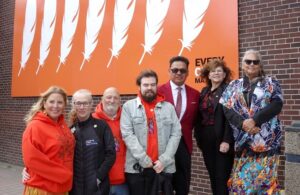Lakehead University unveils Every Child Matters outdoor art installation

By Rick Garrick
THUNDER BAY — Lakehead University unveiled an Every Child Matters outdoor art installation during its National Centre for Truth and Reconciliation (NCTR) Survivors’ Flag raising ceremony on Sept. 6 at the Thunder Bay campus.
“Anyone who visits our campus will see this artwork as a powerful symbol of our collective journey toward understanding and reconciliation,” says Gillian Siddall, president and vice-chancellor at Lakehead University. “It not only commemorates Survivors and those who tragically lost their lives, but it also serves as a daily reminder of our responsibility to foster an inclusive and respectful community. It marks a central space on campus for reflection, dialogue, and connection. And, it stands as a strong symbol of belonging for the many Indigenous students, faculty, and staff who are an integral part of the Lakehead community.”
The art installation, which is located in the Agora Circle, features seven white Eagle Feathers on an orange background, embodying the Seven Sacred Teachings: wisdom, love, respect, bravery, honesty, humility, and truth.
The flag-raising ceremony included a prayer and song by Fort William Elder Sheila DeCorte as well as comments by Siddall, Fort William Chief Michele Solomon, Nishnawbe Aski Nation Deputy Grand Chief Bobby Narcisse, Marten Falls Elder Catherine McGuire, who participated in the flag raising, and other dignitaries.
“Miigwech Elder Sheila DeCorte for guiding us with your wisdom and helping us begin this day in a good way and reminding us of the importance of the truth component of Truth and Reconciliation,” Siddall says. “Today, we come together not only to remember, but to honour the courage, the stories, and the perseverance of the Survivors of Residential and Day Schools along with their families, communities, and nations. A warm welcome to our university community and a special recognition to our honoured guests, the Survivors and intergenerational survivors of these schools. Your presence here with us today is a testament to strength and resilience in the face of profound hardship and we are humbled to share this moment with you.”
Chief Solomon stressed the importance of raising the flag and the unveiling of the Every Child Matters art installation.
“We know it took us a long time to get to this place where we’re having open dialogue, open conversation, and acknowledging some of the truths that have happened, of things that have occurred in our history,” Chief Solomon says. “As we come to terms with those things and work towards correcting some of those things, it’s important that we have these symbolic measures, the art installation, the raising of flags, to make sure these things remain front and centre in our minds and in the work we all do as we work towards improving and healing the relationship between Indigenous peoples and the rest of society, creating that greater awareness of how we got to be in the place we find ourselves today.”
Narcisse says it is important for students to learn more about Indigenous people during their university studies, noting that when he attended Lakehead University, the first-year political studies textbooks only had a paragraph or one chapter devoted to treaties or Indigenous laws.
“Since then, I think it’s been a big push to really instill that history and also that information as well so everyone has that knowledge of how we did come to be and acknowledging many of those challenges and also our contributions of Indigenous people across Canada as well, especially within this region,” Narcisse says. “Our contributions as Indigenous people should be intertwined in a lot of the curriculum, in all of the discussions that are happening.”
Lakehead University has also scheduled a community-based art project led by visual arts student Tashie Broadbent that invites participants to actively contribute to painting a vision of reconciliation from Sept. 9-26.
“Art has the power to create a safe space where the truths of our past can be seen, heard, and felt,” says Denise Baxter, vice-provost Indigenous Initiatives at Lakehead University. “Through this shared creative process, we can weave together the threads of reconciliation, understanding and healing in collaboration with communities and nations on pathways forward. We invite all members of the Lakehead and Thunder Bay communities to participate.”

